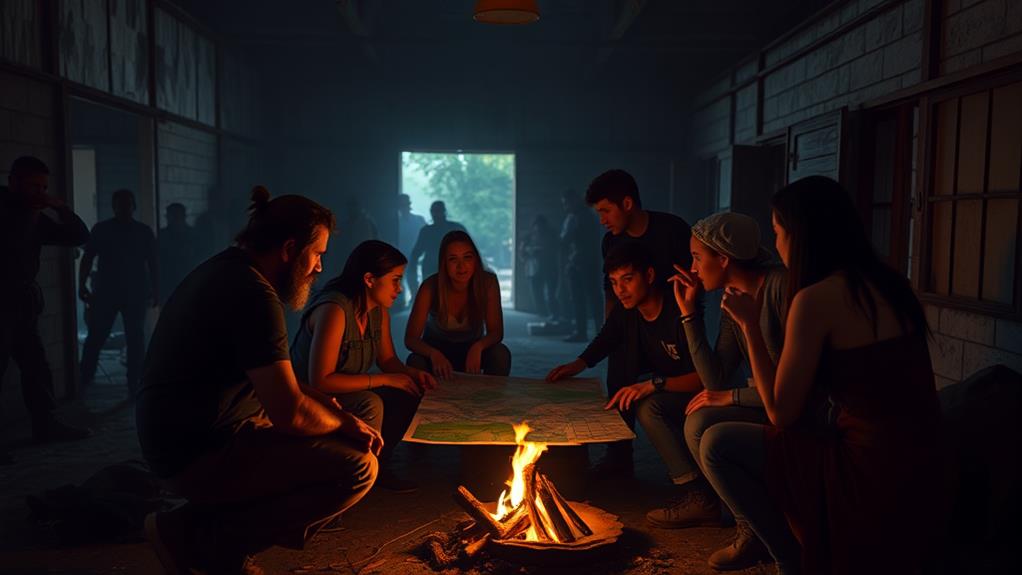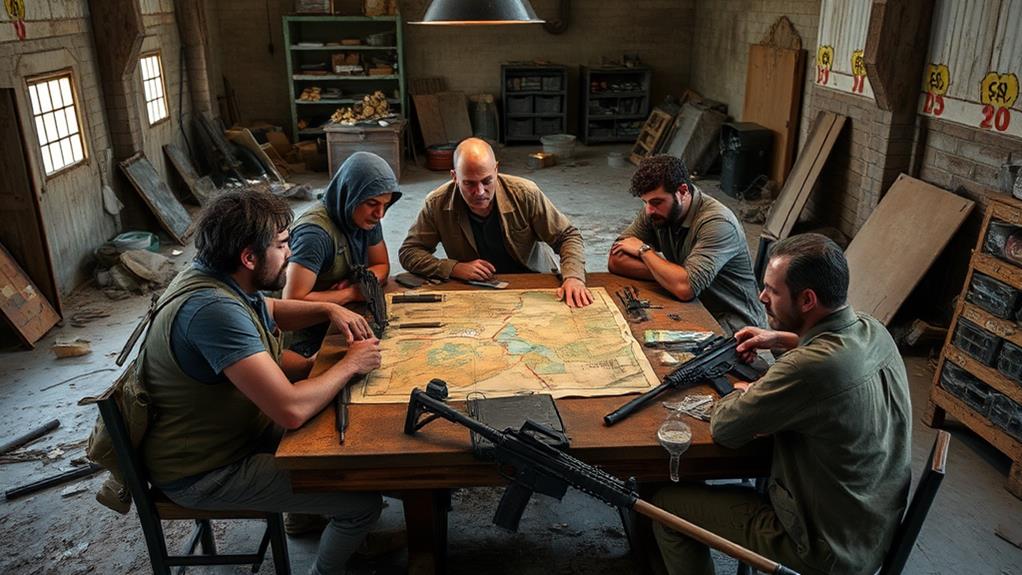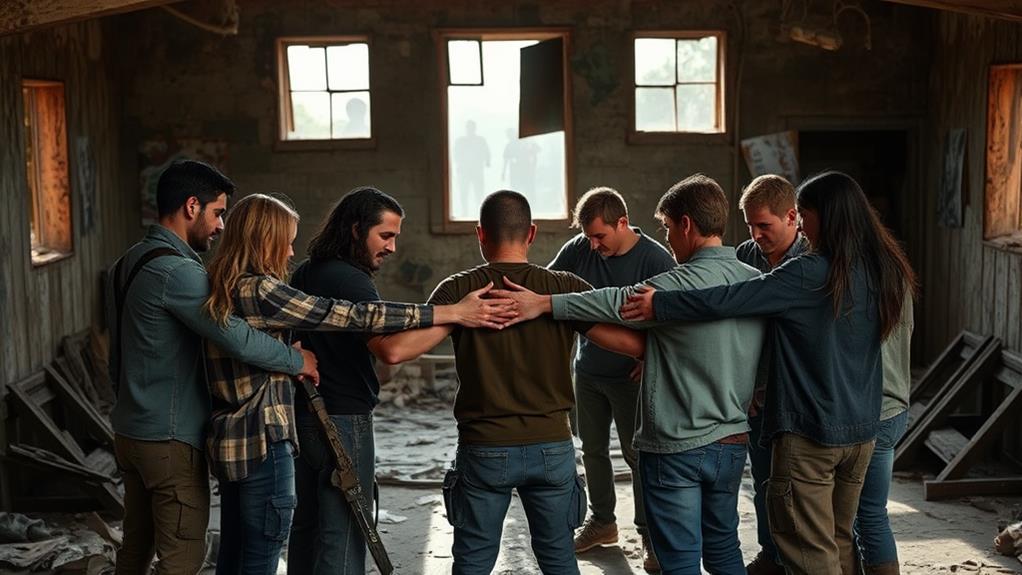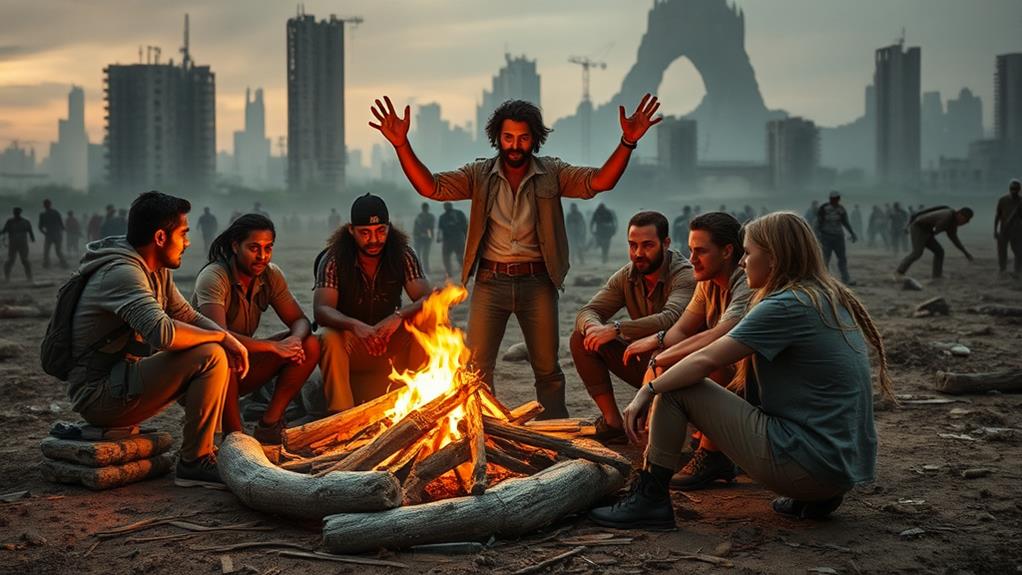
Boosting team cohesion in a zombie apocalypse is vital for survival. Start by assigning clear roles based on strengths; you'll need a decisive leader, a skilled medic, and an agile scout. Establish concise communication channels like walkie-talkies or hand signals to avoid misunderstandings. Build trust through open communication, following through on promises, and helping each other out. Address conflicts directly and set rules for fair decision-making. Show empathy and lead by example to keep everyone's spirits high. Incorporate team-building activities such as survival drills and trust exercises to bond and sharpen skills. Want more practical tips? Look further ahead.
Establish Clear Roles

In a zombie apocalypse, establishing clear roles within your group is essential for survival. You need to identify the strengths and weaknesses of each member to assign roles effectively. For instance, if someone has medical training, they should take on the role of the group's medic. Another person with mechanical skills could be responsible for maintaining vehicles and equipment. This way, everyone knows their responsibilities and can focus on their tasks without confusion.
You'll also need a leader to make quick decisions, especially in high-pressure situations. This person should be someone who can stay calm and think strategically. Make sure to communicate these roles clearly to avoid any overlap or missed responsibilities. It's important to have a scout, someone who's agile and can go ahead to gather information about potential threats or resources.
Effective Communication Strategies
Effective communication is the backbone of any successful team, especially during a zombie apocalypse. You need to make certain that everyone knows what's happening and what's expected of them. Start by establishing clear, concise channels for communication. Whether it's walkie-talkies, hand signals, or a simple whistle, make sure everyone understands how to use them and what each signal means.
Don't forget to prioritize clarity over complexity. Keep your messages short and to the point. During a crisis, there's no time for lengthy explanations. For example, instead of saying, "Please check if the north perimeter is secure," you can say, "North perimeter, check." This saves time and reduces misunderstandings.
Active listening is just as critical as speaking. When someone communicates an update, make sure you acknowledge it and confirm you've understood. This can be as simple as repeating the key points back to them: "Got it, supplies are low."
Building Trust

Trust serves as the foundation of any cohesive team, especially when facing the relentless challenges of a zombie apocalypse. You can't afford to second-guess each other's intentions or capabilities when danger is always lurking. To build that trust, focus on being reliable and transparent. Show your teammates that they can count on you no matter what.
- Follow through on promises: If you say you'll secure the perimeter or gather supplies, confirm you do it. Consistency creates reliability.
- Communicate openly: Share crucial information promptly. Don't withhold knowledge for fear of causing panic; transparency keeps everyone prepared.
- Show vulnerability: Admit when you're scared or unsure. It humanizes you and encourages others to be honest about their feelings and limitations.
- Help each other: Whether it's patching up a wound or sharing your last bit of food, acts of kindness foster a deeper bond.
- Respect boundaries: Understand and honor personal spaces and individual limits. Respect breeds mutual appreciation and trust.
Conflict Resolution Techniques
Just as trust forms the bedrock of a strong team, knowing how to handle conflicts is equally important when traversing the chaos of a zombie apocalypse. When tensions rise, as they inevitably will, having effective conflict resolution techniques can mean the difference between survival and disaster.
First, always address conflicts head-on. Ignoring problems only allows them to fester. Set a time to discuss issues privately, ensuring everyone involved feels safe to speak openly. Listen actively, showing empathy and understanding, even if you disagree. Don't interrupt; let each person express their concerns fully.
Second, focus on finding common ground. In a zombie apocalypse, survival is the ultimate goal. Remind everyone of this shared objective. It helps shift the focus from personal grievances to collective well-being. Encourage compromise and collaboration to find mutually beneficial solutions. Remind the group that disagreements and conflicts only waste precious energy and resources that could be directed towards staying alive. By working together and respecting each other’s strengths, the chances of overcoming obstacles significantly improve. Sharing and implementing survival tips for a zombie apocalypse can further unite the group, fostering a sense of teamwork while increasing everyone’s odds of making it through.
Third, establish clear rules for communication. No shouting, no insults—just constructive dialogue. Create a system for making decisions, whether it's by majority vote or consensus, and stick to it.
Motivational Leadership

Picture a beacon of light in a stormy night—that's what motivational leadership is in a zombie apocalypse. You need to inspire your team when hope seems lost and danger is everywhere. As a leader, your attitude and determination can lift spirits and keep everyone focused.
Here are some key strategies to become that beacon:
- Show empathy: Understand and acknowledge the fears and stresses your team faces.
- Lead by example: Your courage and resilience will encourage others to follow suit.
- Communicate clearly: Keep everyone informed and make sure they know their roles.
- Celebrate small victories: Recognize achievements to boost morale, even in tough times.
- Stay positive: Your optimism can counteract the bleak environment.
When you're a motivational leader, you create an atmosphere where everyone feels valued and driven to survive. Remember, your team looks to you for strength and guidance. By showing them that there's still hope and something to fight for, you can transform a group of frightened individuals into a cohesive, determined unit ready to face the undead together.
Team-Building Activities
Engaging in team-building activities can substantially enhance group cohesion and survival skills during a zombie apocalypse. You might think there's no time for anything but survival, but bonding through purposeful activities can make your group stronger and more effective.
Start by organizing trust exercises. Trust falls may sound cliché, but when you're relying on each other to escape a horde, trust is everything. Pair up team members and have them guide each other through an obstacle course blindfolded. This builds trust and hones your ability to communicate under pressure.
Next, consider survival drills. Simulate scenarios like scavenging for supplies or setting up a temporary shelter. Divide the group into smaller teams and turn it into a friendly competition. This not only sharpens survival skills but also encourages teamwork and quick decision-making.
At a Glance
In the end, your team's survival hinges on unity, much like the fellowship in Tolkien's epic journey. Clear roles, open communication, trust, and effective conflict resolution are your lifelines. Motivational leadership and team-building activities will keep the morale high, reminiscent of brave knights rallying for a noble cause. Embrace these strategies and watch your team transform into an unbreakable force, ready to face any undead challenge with resilience and determination.






